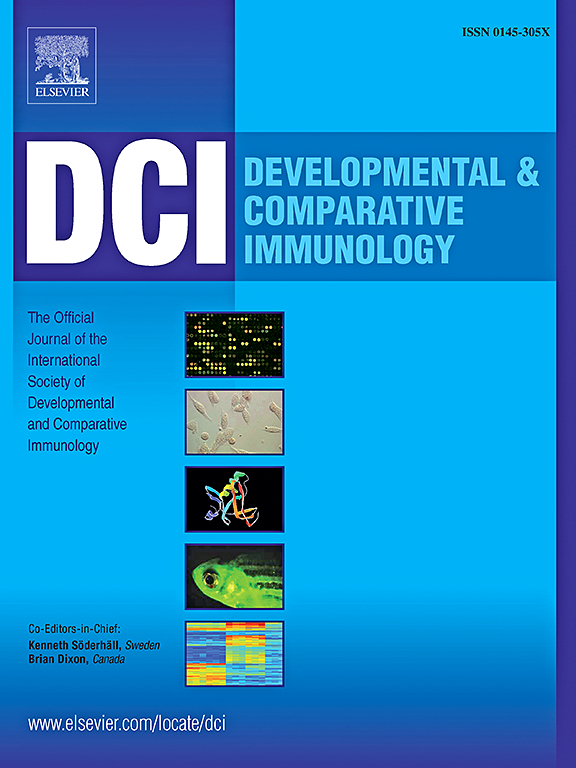Dietary enzyme complex improve the growth performance, digestive ability, antioxidant capacity and immunity, and glycometabolism in Penaeus vannamei fed high-plant-protein diets
IF 2.4
3区 农林科学
Q1 FISHERIES
引用次数: 0
Abstract
In this study, six isonitrogenous and isolipid diets were formulated. A diet containing 12 % fishmeal was used as the fishmeal control group (PC). By using composite plant protein sources (soybean meal, peanut meal, and low-gossypol cottonseed meal) to partially replace fishmeal, a high-plant-protein diet with 4 % fishmeal was formed. In these high-plant-protein diets, 0 %, 0.02 %, 0.04 %, 0.06 %, and 0.08 % enzyme complex preparations (EC) were added and named NC, NCA2, NCA4, NCA6, and NCA8, respectively. The results showed that compared to the PC group, the NC diet significantly reduced the growth performance of white shrimp, which was notably improved after adding EC (WGR, FE, and SGR were significantly increased). Additionally, compared to the NC group, dietary EC significantly improved the antioxidant capacity and immunity of shrimp, enhanced the activities of plasma SOD, LZM, PO, and T-AOC, and the expression of CAT, SOD, GST, and GPx genes in the hepatopancreas. Compared to the NC group, the addition of EC also significantly improved the digestive capacity of the shrimp, with a significant increase in hepatopancreatic Try activity and the expression of Amy and Try genes, as well as a clear upward trend in the apparent digestibility of dry matter and crude protein. The plasma Glu concentration in the NC group was significantly lower than that in the PC and the EC added group. The dietary EC significantly increased the activities of key glycolytic enzymes HK, PK, and PFK in the hepatopancreas of white shrimp, and significantly upregulated the gene expression of HK, PK, and GLUT2 in the hepatopancreas. Furthermore, when compared to the NC group, EC diets notably decreased the activities of the key gluconeogenesis enzymes G6P and PEPCK in the hepatopancreas of white shrimp. Additionally, these diets significantly increased the gene expression of PC and PEPCK in the hepatopancreas of white shrimp. The optimal supplemental level of EC was 0.030–0.031 % by quadratic equation fitting of WGR, SGR, and FE with the dietary supplemental level of EC. In summary, dietary EC supplementation significantly enhanced the utilization of high-plant-protein diets by white shrimp, with the optimal addition amount being 0.030–0.031 % under the conditions of this trial.
饲粮中添加复合酶可提高凡纳滨对虾的生长性能、消化能力、抗氧化能力和免疫能力以及糖代谢。
本试验配制了6种等氮、等脂饲料。以含12%鱼粉的饲料为鱼粉对照组(PC)。采用复合植物蛋白源(豆粕、花生粕和低棉酚棉籽粕)部分替代鱼粉,形成含4%鱼粉的高植物蛋白日粮。在高植物蛋白饲粮中分别添加0%、0.02%、0.04%、0.06%和0.08%的酶配合物制剂(EC),命名为NC、NCA2、NCA4、NCA6和NCA8。结果表明:与PC组相比,NC组显著降低了白对虾的生长性能,添加EC后显著提高了白对虾的生长性能(增重率、精密度和增重率均显著提高)。此外,与NC组相比,饲料中添加EC显著提高了对虾的抗氧化能力和免疫能力,提高了血浆SOD、LZM、PO和T-AOC的活性,以及肝胰腺中CAT、SOD、GST和GPx基因的表达。与NC组相比,EC的添加也显著提高了对虾的消化能力,肝胰脏Try活性、Amy和Try基因表达均显著升高,干物质和粗蛋白质表观消化率均有明显上升趋势。NC组血浆Glu浓度显著低于PC和EC添加组。饲料中添加EC显著提高了白虾肝胰脏中关键糖酵解酶HK、PK和PFK的活性,显著上调了肝胰脏中HK、PK和GLUT2的基因表达。此外,与NC组相比,EC组显著降低了白虾肝胰腺中关键糖异生酶G6P和PEPCK的活性。此外,这些饲料显著提高了白虾肝胰脏PC和PEPCK基因的表达。通过对增重率、SGR和FE与饲粮EC添加水平的二次方程拟合,得出EC的最佳添加水平为0.030 ~ 0.031%。综上所述,饲粮中添加EC可显著提高白对虾对高植物蛋白饲料的利用率,本试验条件下适宜添加量为0.030 ~ 0.031%。
本文章由计算机程序翻译,如有差异,请以英文原文为准。
求助全文
约1分钟内获得全文
求助全文
来源期刊
CiteScore
6.20
自引率
6.90%
发文量
206
审稿时长
49 days
期刊介绍:
Developmental and Comparative Immunology (DCI) is an international journal that publishes articles describing original research in all areas of immunology, including comparative aspects of immunity and the evolution and development of the immune system. Manuscripts describing studies of immune systems in both vertebrates and invertebrates are welcome. All levels of immunological investigations are appropriate: organismal, cellular, biochemical and molecular genetics, extending to such fields as aging of the immune system, interaction between the immune and neuroendocrine system and intestinal immunity.

 求助内容:
求助内容: 应助结果提醒方式:
应助结果提醒方式:


